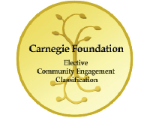CEL Attribute
To carry the CEL attribute, A Drake course partners with a group or organization beyond our campus and includes the following components:
- Learning Outcomes: The community engagement activity is tied to one or more course learning outcomes. These outcomes are ideally found on the syllabus.
- Application and Integration: Guided by their instructor and working with a community partner, students engage with a community issue (local, regional, or global), integrating theory and practice.
- Reciprocity: The community experience seeks to offer value to the community partner as well as to students.
- Reflection and assessment: Students participate in intentional reflection, considering the impact of the experience for the community, their partners, themselves, and their own learning.
Projects may include research, service, advocacy, creative, and other goals. Community partners may include but are not limited to non-profits, public agencies, political offices, affinity or advocacy groups, research firms, educational institutions, and business. They may operate at local, regional, national, or international levels.
To add the CEL attribute to a new or existing course, contact CEL Director Mallary Allen or use the submission form linked below. Instructors and program chairs can request a one-time (section level) or ongoing (course level) tag. Once tagged, students can find CEL courses in the catalog at registration time and see their CEL participation reflected in their transcripts.
CEL Request Form








